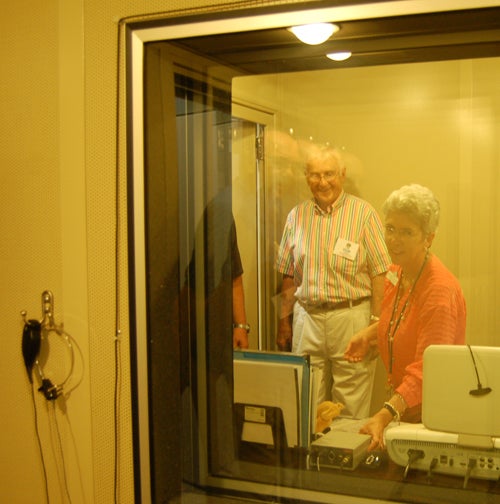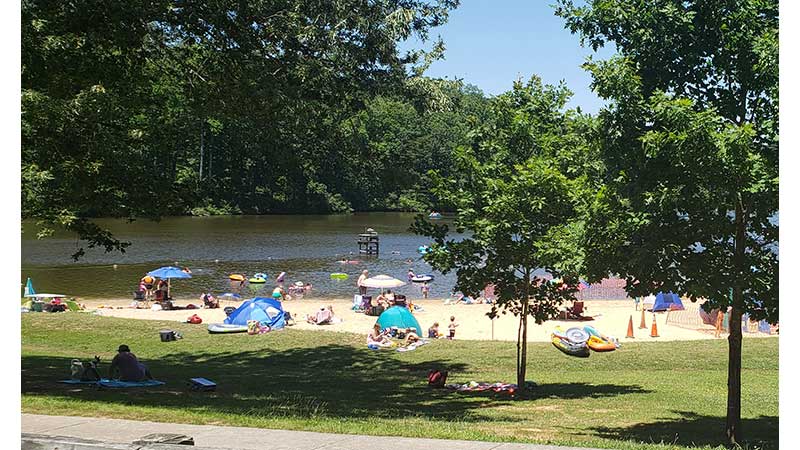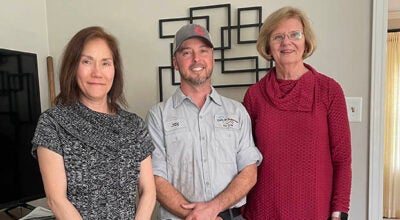Lions learn about hearing
Published 3:16 pm Monday, August 29, 2016

- MARTIN L. CAHN | HERALD Mani Aguilar, right, shows Farmville Lions Club member Tom Young how things work from the control room of the Longwood Speech, Hearing & Learning Services (LSHLS) hearing exam booth. The view is taken from inside the booth where patients are tested to determine the severity of their hearing loss.
According to the Hearing Loss Association of America, about 20 percent of Americans — 48 million people — report some degree of hearing loss, including complete deafness. At age 65, the association says, one out of three people has a hearing loss. Two to three out of 1,000 children have some form of hearing loss.
Not every one of these millions of people can afford hearing aids, which have become more and more sophisticated in recent years. That’s where the Farmville Lions Club comes in. Among its many forms of service to the community, the club includes a Hearing Committee. The committee works toward the mission of the national organization’s Hearing Preservation, Awareness and Action Program: to demonstrate concern and respect for the dignity and independence of people who are deaf, hard of hearing or have speech disorders.
A group of Farmville Lions, including members of its Hearing Committee, gathered at Longwood Speech, Hearing & Learning Services (LSHLS) Aug. 24 to take a tour and learn more about what it does and has to offer.
Hearing Committee Chairman Tom McBride said the Lions formed a partnership with LSHLS — part of Longwood University — in 2010. The partnership helps the Lions go out to schools to speak to fourth graders about preventing hearing loss, McBride said.
LSHLS Director Dr. Lissa Power-deFur a professor of communication and speech disorders at Longwood, led the first part of the tour.
“We started offering services in 2006 as part of our graduate program,” she explained.
At the time, Power-deFur, her staff and graduate students worked in 3,000 square feet of space under a leaky roof. LSHLS now resides in 10,000 square feet of space in a recently constructed building shared with other Longwood entities at 315 W. Third St.
“The layout is amazing,” Power-deFur said, pointing out how the architect even made sure certain rooms were placed away from traffic noise on West Third Street.
Power-deFur went from room to room, showing off state-of-the-art equipment and talking about how the center helps clients not just with hearing losses, but speech delays, stuttering, brain issues and even difficulty swallowing.
She soon handed the group over to Mani Aguilar, LSHLS’ clinical audiologist. Several Lions know her, either having availed themselves of her services, or getting her help with services for others.
“The community has really gotten together. It’s really worked,” Aguilar said. “This is the only full-time service in 10 counties.”
McBride said Aguilar’s qualifications would “take days” to tell.
“We couldn’t have a better audiologist,” he said. “And she doesn’t try to sell hearing aids; she’s trying to get ones which will work best for the patient.”
Aguilar said she’s had patients from birth to “90-something,” having worked in a children’s hospital for many years and another 11 years with the University of Virginia.
“I worked online with Longwood University for eight years, so I already knew there were good people here,” she said.
McBride said Aguilar is on a list of clinical audiologists who can examine veterans locally, rather than having them go all the way to Richmond just for an exam. They still have to go to Richmond once their hearing aid is ready.
“It’s all about education,” Aguilar said. “(Longwood is) the only university with a partnership with the Virginia Department of Deaf and Hard of Hearing. They pay for my time.”
In addition to seeing one of the most modern hearing exam booths in the commonwealth, the Lions met with Aguilar in her office to talk about the Hear Now Foundation, which assists low-income people who qualify with hearing aids for as little as $250 a pair.
LSHLS also offers aural rehabilitation, where patients don’t just merely receive their hearing aids, but learn how to use them — essentially, how to hear again.
She said she is planning another round of the program and will soon be sending out letters to her newer patients.





